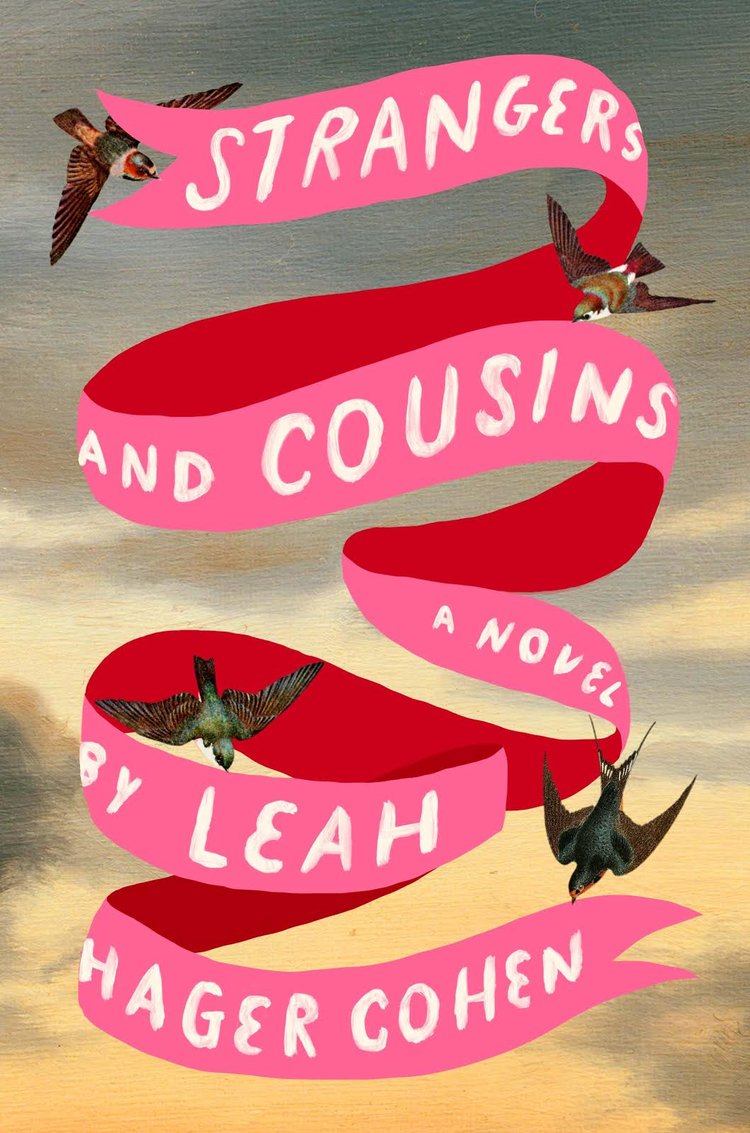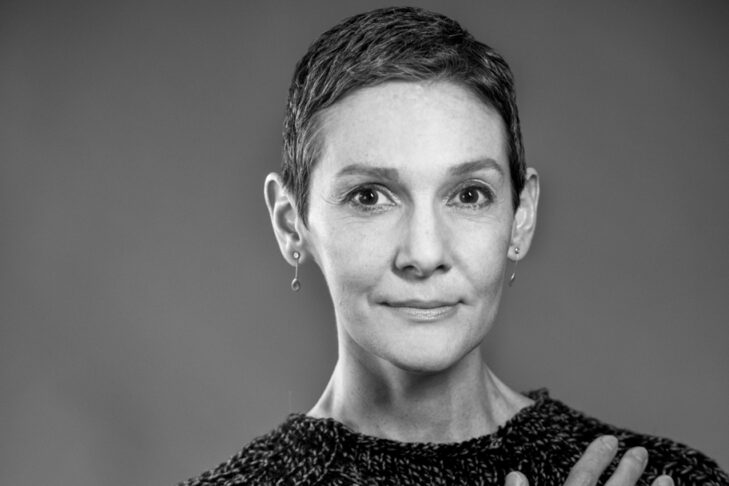Walter and Bennie Blumenthal have raised their four children—ranging in age from 5 to 22—in the same home in which Bennie and her forebears grew up. It’s a large, rambling house in a village north of New York City—a place that bears a distinct resemblance to towns in Rockland County, New York, where ultra-Orthodox Jews, or Haredim, have settled.
The very liberal and interfaith Blumenthal family is deep into their chaotic preparations for daughter Clem’s wedding. Clem’s gay, biracial nuptials are not the only thing happening in the small town of Rundel Junction. A majority of the people in town are distressed over the growing presence of Haredi Jews buying up houses. This is the intriguing beginning of Leah Hager Cohen’s riveting novel, “Strangers and Cousins.”
The suspicious, mostly WASP residents of Rundel Junction have seen how this Haredi takeover has unfolded in other towns in the area. Property values have dropped, and Haredim eventually take over school boards and slash public school budgets, affecting a majority of students who are Latinx and African American.
The wedding brings together four generations of Bennie’s family. The plot mostly takes place in the Blumenthal house—a house that was once the town’s post office and general store. One of the earliest occupants of the family abode was Great-Aunt Glad. Now a frail nonagenarian, she arrives at the Blumenthal’s to attend Clem’s wedding. Her growing inability to separate the past from the present brings up a tragedy that roiled the town almost a century ago. Thus, Rundel Junction’s history is manifested in Glad’s physical and psychological scars.
During the five days leading up to the wedding, Clem is planning a guerrilla pageant of her own to upend her nuptials. As Hager Cohen writes, “There’s certainly something in the air—but is it festivity?” Hager Cohen deftly handles questions concerning anti-Semitism, secular Judaism and the limits of what broad-minded people like Bennie and Walter are willing to accept in their town. She contains these subjects in a deep, smart domestic novel.
Hager Cohen recently spoke to JewishBoston about the issues brought up in “Strangers and Cousins,” as well as her recent and profound embrace of Judaism.
You wrote a beautiful essay for Lilith Magazine about embracing Judaism. What have been the highlights of your Jewish journey?
As a kid, my experience of Judaism was attending a secular socialist Jewish summer camp called Camp Kinderland. I also went to a secular Jewish Sunday school. In lieu of a bat mitzvah, I had a Sunday school graduation. I read an essay I had written about Ernestine Rose, the Jewish suffragette and abolitionist. My sense of being Jewish was completely secular. Then, quite to my surprise, when I was 47, I had this hunger to be in community and [celebrate] Shabbat. Consequently, I’ve been going to Torah study for the past four years. And I’m now a first-time member of a shul.
I’ve been a lifetime searcher, which has taken various forms at different times. My bias at what strikes me as very traditional, conservative and formal prevented me for so many decades from joining a shul. It seemed that belonging to a temple might be confining. I had a prejudice that tradition might be rigid and would require me to give up certain types of questions. A close friend, who is an Episcopal priest, introduced me to the possibility of being really radical and really religious.

In “Strangers and Cousins,” Walter is Jewish; Bennie is not. Are they at all reflective of your upbringing?
Yes and no. In the broadest strokes, my dad is Jewish. My mom wasn’t. Aspects of Walter are a bit like my father, in that they are both secular Jews. The part that borrows the most from real life is that for many decades my father was active in local chapters of the NAACP in Rockland County, New York. For more than a decade, he has also been deeply involved in a social justice struggle in East Ramapo in Rockland County. It’s a community where the Haredi population increased a lot and is having a huge effect on the schools. In real life, public school children are 90% black and Latinx. I didn’t take on that issue in the novel, but in my father’s community, race and racism are a huge part of the complicated changes in the community. For his work on the issue, my dad was named to the Forward 50 list of notable Jews one year.
Midway through the first draft of the novel, I realized there was a deep issue here. I was aware that there are complicated issues of tribalism, even within a nuclear family and marriage. Any marriage involves tribes mixing. Weddings are occasions for a lot of the friction and energy and complications that happen around feelings of tribalism. That’s what made me want to look at issues of tribalism that arise in a community. Being my father’s daughter, I have a strong point of view about what I perceive to be the harm that’s happening to minority members and disenfranchised members of East Ramapo. I found I was writing and coming to this issue, particularly at the end of the book, in an openhearted way.
In the novel, swastikas are spray-painted on the development being built for Haredi housing. Why did you feel it was essential to address anti-Semitism in the novel?
From what I understand about the facts on the ground, it offends me as a Jew and as a human being when people accuse others of anti-Semitism as a smoke screen to cover up injustices that group might be committing. We see that in East Ramapo. While this doesn’t extend to the entire Haredi community, it’s become a knee-jerk accusation by the leaders of the Haredi community. Any time someone challenges what the Haredim are doing with their particular power, the call of anti-Semitism is being used to shut down conversation, and that offends me. Anti-Semitism is real, and occasionally, cries of anti-Semitism are being used to allow a group with the most power to perpetuate injustice. It’s so tricky to disentangle what is anti-Semitic and what is not. And it’s particularly tricky for non-Jews. The fear of being called anti-Semitic is strong in blue states. It can be an effective weapon against politicians. One of the things my dad did to combat that was to create Rockland Clergy for Social Justice.
I read that your reading of late has been mostly about Judaism. To that end, I understand you’ve been reading Jewish and Israeli writers. Who have you been reading, and what are you learning from them?
Aviva Gottlieb Zornberg is at the top of the list. I was swept off my feet with the way she explores Torah and Talmud. Her love of language and her incredible openness of interpretation are incredible. Going to Torah story has been very moving for me. I’ve discovered an “unboundedness” of what interpreting involves, as well as the energy, humor and playfulness it involves. The Jewishness of interpretation is so alive. Connections that Zornberg makes are so unexpected. The different poets, psychoanalysts, artists and philosophers that she brings to the table makes for a very rich experience.
I’ve been reading a slim collection of short stories called “After Abel and Other Stories” by Michal Lemberger that are like modern midrashim. Lemberger imagines different stories from the perspectives of women who are barely mentioned in the Torah. I’m also enjoying contemporary Israeli writers like Amos Oz, David Grossman and Etgar Keret—writers I didn’t previously know.
This interview has been edited and condensed.
Leah Hager Cohen will be in conversation with JewishBoston’s culture reporter, Judy Bolton-Fasman, on Thursday, Oct. 24, at Temple Emanuel in Newton. Find more information here.



